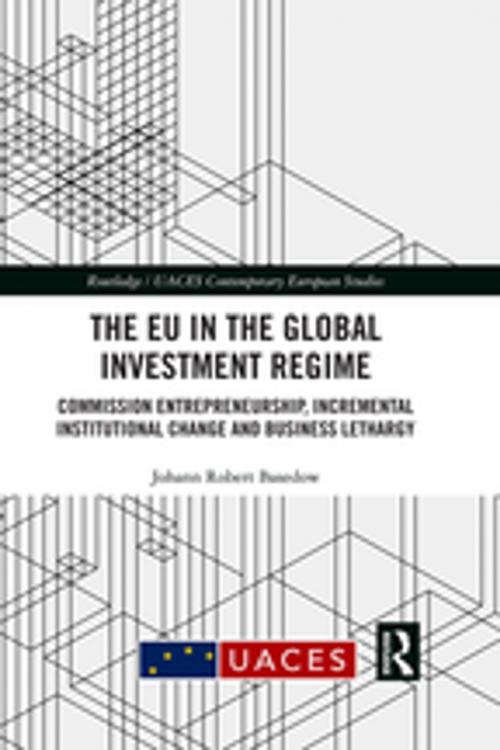The EU in the Global Investment Regime
Commission Entrepreneurship, Incremental Institutional Change and Business Lethargy
Nonfiction, Social & Cultural Studies, Political Science| Author: | Johann Robert Basedow | ISBN: | 9781351621564 |
| Publisher: | Taylor and Francis | Publication: | November 7, 2017 |
| Imprint: | Routledge | Language: | English |
| Author: | Johann Robert Basedow |
| ISBN: | 9781351621564 |
| Publisher: | Taylor and Francis |
| Publication: | November 7, 2017 |
| Imprint: | Routledge |
| Language: | English |
The European Union (EU) has emerged as a key actor in the global investment regime since the 1980s. At the same time, international investment policy and agreements, which govern international investment liberalisation, treatment and protection through investor-to-state dispute settlement, have become increasingly contentious in the European public debate.
This book provides an accessible introduction to international investment policy and seeks to explain how the EU became an actor in the global investment regime. It offers a detailed analysis of the EU’s participation in all major trade and investment negotiations since the 1980s and EU-internal competence debates to identify the causes behind the EU’s growing role in this policy domain. Building on principal-agent and historical institutionalist models of incremental institutional change, the book shows that Commission entrepreneurship was instrumental in the emergence of the EU as a key actor in the global investment regime. It refutes business-centred liberal intergovernmental explanations, which suggest that business lobbying made the Member States accept the EU’s growing role and competence in this domain. The book lends support to supranational and challenges intergovernmental thinking on European Integration.
This text will be of key interest to scholars, students and practitioners of European and regional integration, EU foreign relations, EU trade and international investment law, business lobbying, and more broadly of international political economy.
The European Union (EU) has emerged as a key actor in the global investment regime since the 1980s. At the same time, international investment policy and agreements, which govern international investment liberalisation, treatment and protection through investor-to-state dispute settlement, have become increasingly contentious in the European public debate.
This book provides an accessible introduction to international investment policy and seeks to explain how the EU became an actor in the global investment regime. It offers a detailed analysis of the EU’s participation in all major trade and investment negotiations since the 1980s and EU-internal competence debates to identify the causes behind the EU’s growing role in this policy domain. Building on principal-agent and historical institutionalist models of incremental institutional change, the book shows that Commission entrepreneurship was instrumental in the emergence of the EU as a key actor in the global investment regime. It refutes business-centred liberal intergovernmental explanations, which suggest that business lobbying made the Member States accept the EU’s growing role and competence in this domain. The book lends support to supranational and challenges intergovernmental thinking on European Integration.
This text will be of key interest to scholars, students and practitioners of European and regional integration, EU foreign relations, EU trade and international investment law, business lobbying, and more broadly of international political economy.















